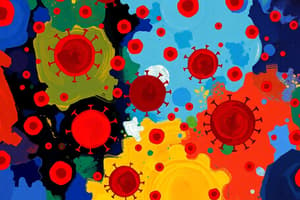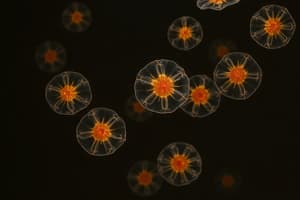Podcast
Questions and Answers
What is the primary function of plasma cells in the immune response?
What is the primary function of plasma cells in the immune response?
- Secretion of cytokines to enhance cellular communication
- Activate cytotoxic T cells for targeted destruction
- Rapidly secrete antibodies to neutralize antigens (correct)
- Differentiate into memory B cells for future immune responses
Which molecules are primarily responsible for T lymphocytes' recognition of antigens?
Which molecules are primarily responsible for T lymphocytes' recognition of antigens?
- Immunoglobulin receptors
- T-cell receptors (TCRs) (correct)
- Cytokine receptors
- Nuclear receptors
What role do CD4+ T cells play in the immune response?
What role do CD4+ T cells play in the immune response?
- Function as helper T cells enhancing immune activity (correct)
- Act as regulatory cells to suppress immune responses
- Recognize antigens presented by Class I MHC
- Directly kill infected host cells
Which of the following best describes cytokines?
Which of the following best describes cytokines?
In which compartment do T lymphocytes mature?
In which compartment do T lymphocytes mature?
What distinguishes CD8+ T cells from CD4+ T cells?
What distinguishes CD8+ T cells from CD4+ T cells?
Which cells are known for presenting antigens to T cells?
Which cells are known for presenting antigens to T cells?
Which process is triggered by the binding of cytokines to their receptors?
Which process is triggered by the binding of cytokines to their receptors?
What is the primary function of CD8+ T cells after activation?
What is the primary function of CD8+ T cells after activation?
Which type of T-helper cells is responsible for producing interferons?
Which type of T-helper cells is responsible for producing interferons?
In humoral immunity, which cell type is primarily responsible for the secretion of antibodies?
In humoral immunity, which cell type is primarily responsible for the secretion of antibodies?
What is a key difference between humoral immunity and cell-mediated immunity?
What is a key difference between humoral immunity and cell-mediated immunity?
What role do cytokines play in immune response regulation?
What role do cytokines play in immune response regulation?
Which type of immune response is characterized by the formation of memory B cells and plasma cells?
Which type of immune response is characterized by the formation of memory B cells and plasma cells?
What is the main function of antigen presenting cells (APCs) in the immune system?
What is the main function of antigen presenting cells (APCs) in the immune system?
Which type of T-helper cell produces interleukins that promote B cell activity?
Which type of T-helper cell produces interleukins that promote B cell activity?
What triggers the activation of helper T-cells during the immune response?
What triggers the activation of helper T-cells during the immune response?
Which of the following best describes the role of cytokines in B-cell activation?
Which of the following best describes the role of cytokines in B-cell activation?
How do cytotoxic T lymphocytes (CTLs) recognize target cells?
How do cytotoxic T lymphocytes (CTLs) recognize target cells?
What is the significance of antigen-presenting cells (APCs) in the immune response?
What is the significance of antigen-presenting cells (APCs) in the immune response?
Which type of T-cell remains in a resting state until subsequent encounters with pathogens?
Which type of T-cell remains in a resting state until subsequent encounters with pathogens?
What is the primary role of MHC molecules in immune response regulation?
What is the primary role of MHC molecules in immune response regulation?
What is a key distinguishing characteristic of naive CD4+ T-cells before activation?
What is a key distinguishing characteristic of naive CD4+ T-cells before activation?
Flashcards
B cell activation
B cell activation
Interaction of naive B cells with antigen, macrophages, and T-cells leads to rapid B cell proliferation and differentiation.
Memory B cells
Memory B cells
B cells that remain in the body to provide rapid response upon future exposure to the same antigen.
Plasma cells
Plasma cells
Differentiated B cells that secrete antibodies to neutralize or eliminate the antigen.
T lymphocytes
T lymphocytes
Signup and view all the flashcards
T cell receptors (TCR)
T cell receptors (TCR)
Signup and view all the flashcards
Major Histocompatibility Complex (MHC)
Major Histocompatibility Complex (MHC)
Signup and view all the flashcards
Helper T cells (TH)
Helper T cells (TH)
Signup and view all the flashcards
Cytotoxic T cells (TC)
Cytotoxic T cells (TC)
Signup and view all the flashcards
Naive T cells
Naive T cells
Signup and view all the flashcards
Interferons
Interferons
Signup and view all the flashcards
Interleukins
Interleukins
Signup and view all the flashcards
Primary Immune Response
Primary Immune Response
Signup and view all the flashcards
B-cell receptors (BCRs)
B-cell receptors (BCRs)
Signup and view all the flashcards
Lymphoid organs
Lymphoid organs
Signup and view all the flashcards
MHC-II molecules
MHC-II molecules
Signup and view all the flashcards
Helper T-cells
Helper T-cells
Signup and view all the flashcards
Antigen-Antibody Reaction
Antigen-Antibody Reaction
Signup and view all the flashcards
Cell Mediated Immune Response (CMI)
Cell Mediated Immune Response (CMI)
Signup and view all the flashcards
Study Notes
Adaptive Immunity
- Adaptive immunity is a slower response triggered when innate immunity fails to stop a pathogen
- It involves specific recognition and elimination of foreign invaders
- Adaptive immunity is highly specific, diverse, has memory, and distinguishes self from non-self
Four Characteristics of Adaptive Immunity
- Specificity: The ability to target particular foreign molecules
- Diversity: The ability to recognize and respond to a vast array of pathogens
- Memory: The ability to remember past exposures to pathogens to mount a stronger response upon re-exposure
- Distinction between self and non-self: The ability to differentiate between the body's own cells and foreign invaders
B Lymphocytes
- B cells are produced in the bone marrow, mature there and are named due to their origin in birds (Bursa of Fabricius)
- They express membrane-bound antibody molecules (BCRs) with unique antigen-binding sites
- Activation leads to proliferation and differentiation into plasma cells (secrete antibodies) and memory B cells
- They involve in antibody production
T Lymphocytes
- T cells mature in the thymus and express T cell receptors (TCRs)
- TCRs do not directly recognize antigens, instead they recognize antigens presented by other cells
- Two major types: Helper T cells (TH) and Cytotoxic T cells (Tc)
- Helper T cells activate other immune cells. Cytotoxic T cells directly kill infected or cancerous cells
Cytokines
- Cytokines are low molecular weight proteins or glycoproteins with regulatory roles
- secreted by white blood cells
- can act on the same cell that produces them (autocrine action), nearby cells (paracrine action), or far away cells (endocrine action)
- involved in activating and inhibiting cell functions
- Examples: TNF-a (inflammation, acute-phase proteins), Interferon-a (antiviral), Interleukin-2 (proliferation of T and B cells), Interferon-y (activates macrophages)
Humoral Immunity (Antibody-Mediated Immunity)
- Antibodies are immunoglobulins in bodily fluids
- Created by activated B-cells
- Classes include IgG, IgM, IgA, IgE, and IgD
- Neutralize pathogens, cause agglutination, promote phagocytosis, activate complement and target foreign substances for destruction
Cell-Mediated Immunity (CMI)
- Involves T cells and other cells to fight pathogens like bacteria and viruses or cancerous cells
- Antigen presented to TH cells and CD8+ T cells
- CD8+ T cells become Cytotoxic T cells (CTLs)
- CTLs kill cells infected with pathogens
Primary and Secondary Immune Responses
- Primary Response: Initial encounter with an antigen - slow response with low antibody levels, produces antibody IgM and memory B and T cells.
- Secondary Response: Subsequent encounter with the same antigen - rapid and strong response with high antibody levels, predominantly IgG, due to memory cells from primary response
Innate and Adaptive Immune Systems
- Innate and adaptive immune systems work together
- Innate system detects pathogens and generates signals for adaptive immunity
- Antigen presenting cells (APCs) process antigens and present them to adaptive immune cells, to allow the body to react against the pathogen
Acquired Immunity
- Naturally acquired active immunity: Develops after exposure to pathogens
- Naturally acquired passive immunity: Antibodies acquired from another source, mother to child
- Artificially acquired active immunity: Through vaccination which introduces a weakened or deactivated form of the pathogen
- Artificially acquired passive immunity: Introducing preformed antibodies to provide immediate protection
Vaccination
- Using a vaccine to introduce a weakened/killed form of a pathogen
Studying That Suits You
Use AI to generate personalized quizzes and flashcards to suit your learning preferences.



